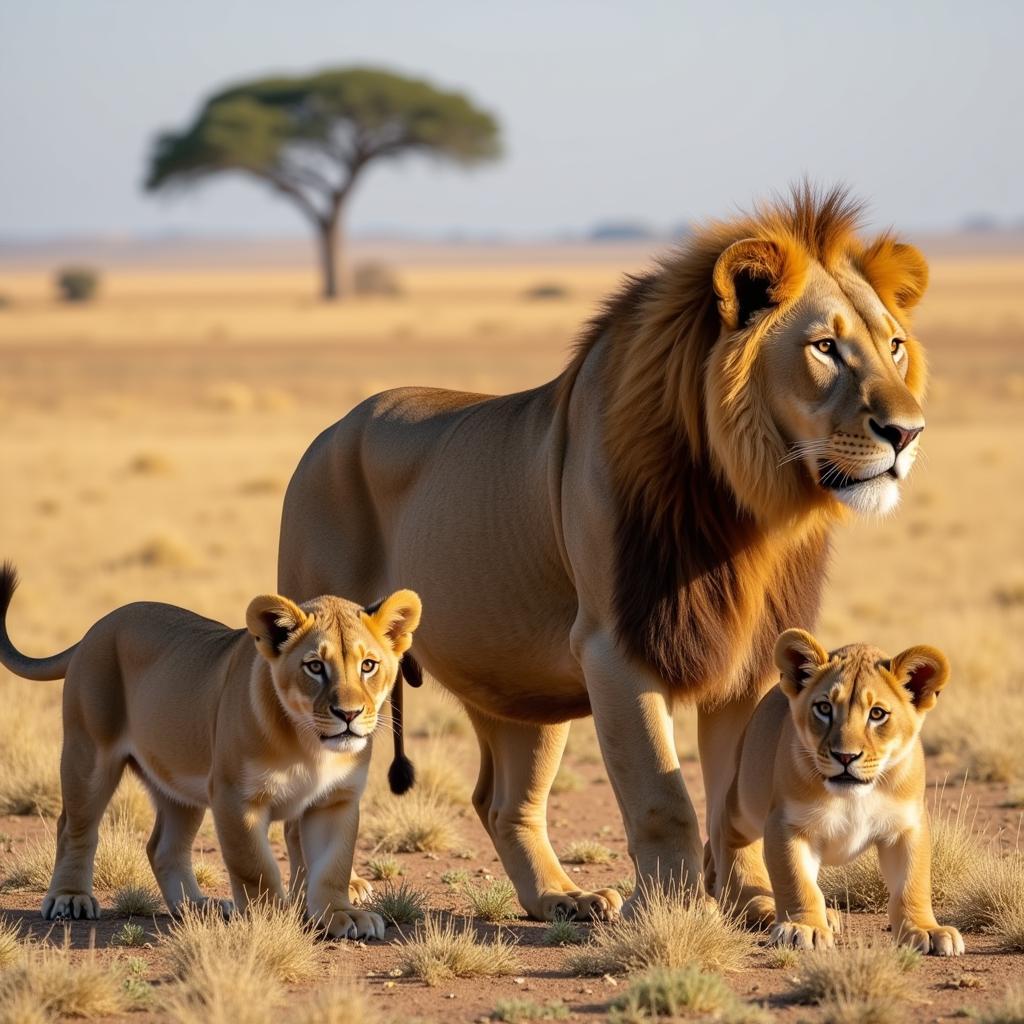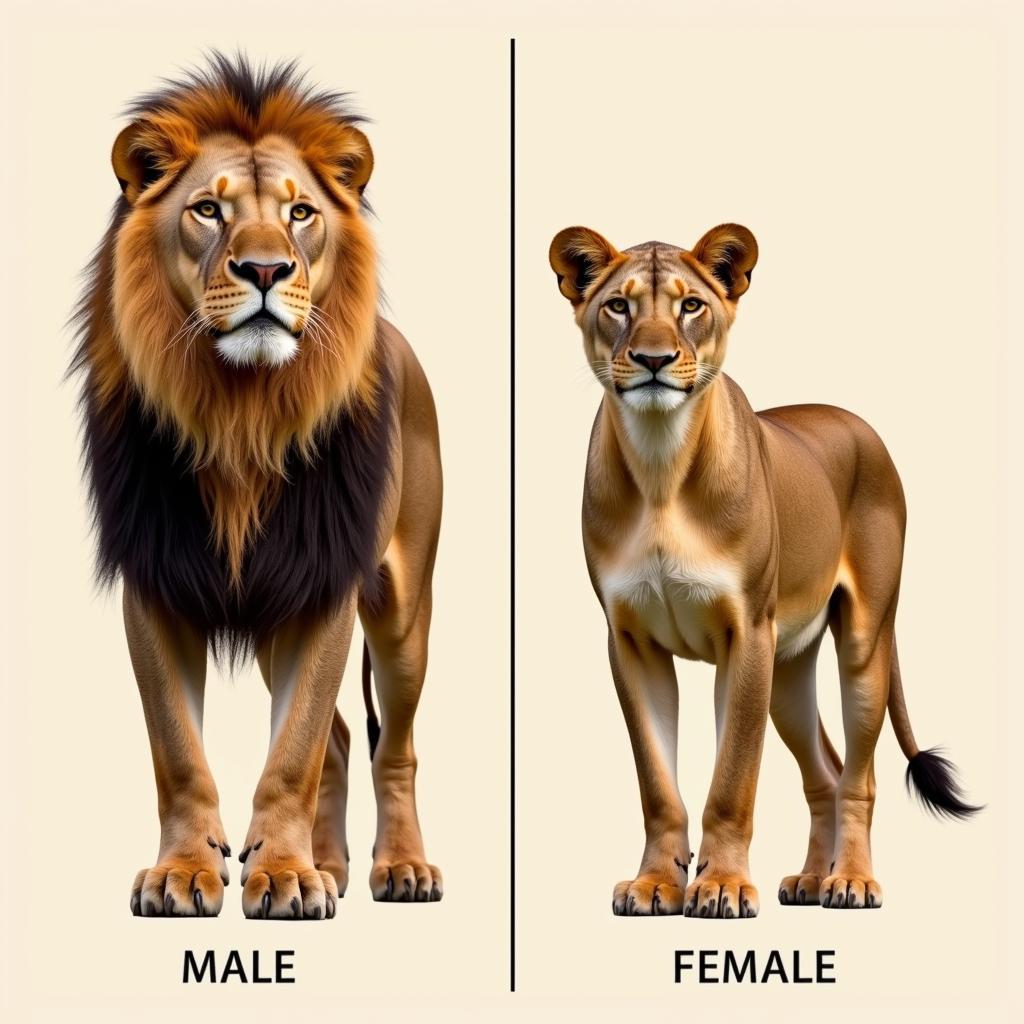African Lion Weight: A Comprehensive Guide
African Lion Weight is a fascinating topic, revealing much about these majestic creatures and their role in the African ecosystem. From their powerful build to their hunting prowess, understanding lion weight provides insights into their lives. Let’s delve into the world of these apex predators and explore the factors that influence their size and weight.  African Lion Pride Weight Comparison
African Lion Pride Weight Comparison
Unraveling the Factors Affecting African Lion Weight
Several factors influence an African lion’s weight. These include sex, age, genetics, and environmental factors such as prey availability and habitat. Understanding these factors helps us appreciate the variations in lion size across different regions and populations. Males are significantly larger than females, a characteristic known as sexual dimorphism. This difference plays a crucial role in their social structure and hunting strategies.
The Impact of Sex and Age on Lion Weight
Male lions, with their impressive manes, are typically much heavier than females. A mature male lion can weigh between 330 and 570 pounds (150-260 kg), while a female typically weighs between 270 and 400 pounds (120-180 kg).  Male and Female African Lion Weight Difference Age also plays a critical role. Cubs, at birth, weigh only a few pounds and gradually increase in size as they mature. They reach their full adult weight around five to seven years of age.
Male and Female African Lion Weight Difference Age also plays a critical role. Cubs, at birth, weigh only a few pounds and gradually increase in size as they mature. They reach their full adult weight around five to seven years of age.
What is the average weight of a male African lion? A mature male African lion typically weighs between 330 and 570 pounds (150-260 kg).
Habitat and Prey Availability: Their Influence on Lion Size
The environment plays a significant role in determining lion size. Lions living in areas with abundant prey tend to be larger than those in regions with limited food resources. This is because a consistent and rich diet allows for optimal growth and development. Similarly, habitat variations can influence size. Lions in more open savannahs may develop differently compared to those in denser woodland areas.
Where do heavier lions typically live? Heavier lions typically live in areas with abundant prey and favorable environmental conditions.
African Lion Weight Compared to Other Big Cats
How does the African lion’s weight compare to other big cats? The African lion is the second largest cat species in the world, second only to the tiger. While tigers can reach weights exceeding 600 pounds, the average lion is still a formidable predator. african cat description This weight advantage over other African predators, such as leopards and cheetahs, solidifies their position at the top of the food chain. african animals facts cheetah
The Role of Weight in Lion Hunting and Social Dynamics
Weight plays a critical role in the hunting success and social dynamics of lions. Their substantial size and strength allow them to take down large prey, including zebras, wildebeest, and even buffalo. african buffalo wild life This hunting prowess ensures their survival and contributes to the overall balance of the ecosystem. Within their social structure, larger males often have an advantage in competing for dominance and mating rights.
Dr. Anika Mosi, a renowned wildlife biologist specializing in African lion conservation, notes, “The weight of a lion is not just a number; it’s a reflection of its health, environment, and position within its pride. It’s a crucial indicator that helps us understand the complex interplay of factors affecting these magnificent animals.”
Conservation Efforts and the Future of African Lions
Understanding African lion weight and the factors influencing it is crucial for conservation efforts. By monitoring lion populations and their size, researchers can gain valuable insights into the health and stability of these ecosystems. Protecting their habitats and ensuring adequate prey availability are essential steps in securing the future of these iconic African predators.
Dr. Kamau Mwangi, a leading expert in African wildlife conservation, states, “Protecting the African lion requires a comprehensive approach that addresses habitat loss, human-wildlife conflict, and the impact of climate change. By understanding the intricate details of their lives, including their weight and its significance, we can develop more effective conservation strategies.”
In conclusion, African lion weight is a complex and fascinating topic that provides insights into the lives of these majestic creatures. From their powerful physique to their crucial role in the ecosystem, understanding the factors influencing their weight is essential for both appreciating their magnificence and ensuring their continued survival. By supporting conservation initiatives and promoting responsible tourism, we can contribute to the preservation of these iconic animals for generations to come. african jewellery designs
FAQ: Frequently Asked Questions about African Lion Weight
- What is the average weight of a female African lion? Female African lions typically weigh between 270 and 400 pounds (120-180 kg).
- How much does a lion cub weigh at birth? Lion cubs weigh only a few pounds at birth.
- What factors influence African lion weight? Factors include sex, age, genetics, prey availability, and habitat.
- Why are male lions generally larger than females? This difference, known as sexual dimorphism, plays a role in social structure and hunting.
- How does the African lion’s weight compare to other big cats? The African lion is the second largest cat species, second only to the tiger.
- Why is understanding lion weight important for conservation? Monitoring weight can provide insights into the health and stability of lion populations and ecosystems.
- How can I contribute to African lion conservation? Supporting conservation initiatives and promoting responsible tourism are key ways to help.
For further inquiries, please contact us at +255768904061, email us at kaka.mag@gmail.com, or visit us at Mbarali DC Mawindi, Kangaga, Tanzania. Our customer service team is available 24/7.

